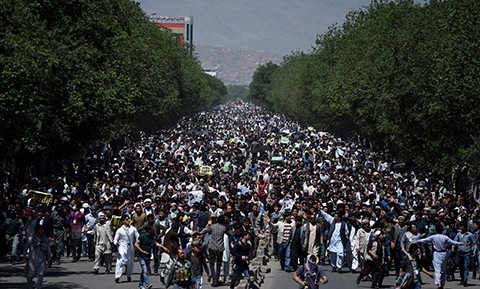 TOPSHOT - Afghan protesters chant anti-government slogans during a demonstration in Kabul on May 16, 2016, held to demand that The Turkmenistan-Uzbekistan-Tajikistan-Afghanistan-Pakistan (TUTAP)electricity line linking energy-rich central Asia pass through a central Hazara-dominated area.
TOPSHOT - Afghan protesters chant anti-government slogans during a demonstration in Kabul on May 16, 2016, held to demand that The Turkmenistan-Uzbekistan-Tajikistan-Afghanistan-Pakistan (TUTAP)electricity line linking energy-rich central Asia pass through a central Hazara-dominated area.Tens of thousands of minority Shiite Hazaras marched through the streets of the Afghan capital Monday to protest at the proposed route for a major power transmission line, in a brewing political crisis for the beleaguered government. / AFP PHOTO / WAKIL KOHSAR
KABUL: Tens of thousands of minority Shiite Hazaras demonstrated through the streets of Kabul yesterday, demanding that a key power transmission line pass through their electricity-starved province, in the second major anti-government protest in recent months.
Authorities locked down central Kabul, blocking key intersections with stacked shipping containers as the protesters marched on the presidential palace, holding unlit lanterns and banners with slogans such as "justice and light".
The demonstration, which spotlights the war-torn nation's turbulent politics, follows one of the biggest anti-government rallies for years last November, which was galvanised by the beheading of a group of Hazaras.
Some protesters pelted rocks at officials and banged on the sides of containers, prompting police to sporadically use water cannon against them but the demonstration was largely peaceful. "(President) Ashraf Ghani is hiding himself behind blast walls," Dawood Naji, a Hazara leader, told flag-waving demonstrators, drawing rousing applause. "We can break down these containers if we want but we are here to protest in a civilised way for our rights."
Authorities shut down roads to the presidential palace, fearing a repeat of the violence in November when protesters tried to scale the walls of the compound. The 500-kilovolt TUTAP power line, which would connect the Central Asian nations of Turkmenistan, Uzbekistan and Tajikistan with electricity-hungry Afghanistan and Pakistan, is seen as a crucial infrastructure project.
But it has been mired in controversy, with leaders from the minority group demanding that the line be routed through Bamiyan, one of the most deprived areas of Afghanistan with a large Hazara population.
The line was originally set to pass through the central province but the government rerouted it through the mountainous Salang pass north of Kabul, saying the shorter route would speed up the project and save millions of dollars.
Hazara leaders in the ethnically divided nation lashed out at the Pashtun president, calling the decision prejudiced against the Hazaras, a community that has suffered a long history of oppression.
Persecuted community
"Bamiyan has seen no development in 15 years (since the Taleban were toppled from power)," Hazara lawmaker Arif Rahmani told AFP. "We are demanding justice, not charity."
Ghani has appointed a commission to review the multi-million-dollar project and assured the protesters that Bamiyan would receive electricity from it even if the transmission line does not pass through the province.
The rally comes in the midst of the Taleban's annual spring offensive launched last month and authorities said the streets were blocked with shipping containers to prevent any insurgent attacks during the protests.
The dispute, which highlights the challenges of modernizing the country, threatens to overshadow the TUTAP project, which is due to be implemented by 2018 and could help ease crippling nationwide blackouts. yesterday's protest underscores Ghani's rising unpopularity amid endemic corruption, rampant unemployment and a worsening 15-year Taleban insurgency.
Hazara protesters last week repeatedly heckled Ghani during an anti-corruption summit in London. The three million-strong Afghan Hazara community has been persecuted for decades, with thousands killed in the late 1990s by Al-Qaeda and the mainly Pashtun and Sunni Taleban.
There has been a surge in violence against the community, with a series of kidnappings and killings in recent months that have triggered a wave of fury on social media. Last November thousands of protesters marched coffins containing the decapitated bodies of seven Hazaras through the Afghan capital.
Their bodies were found in the southern province of Zabul, which is under Taleban control and has been the scene of clashes between rival militant factions. Ghani called the killings "the shared pain of a nation" and accused the militants of trying to divide Afghanistan.-AFP










